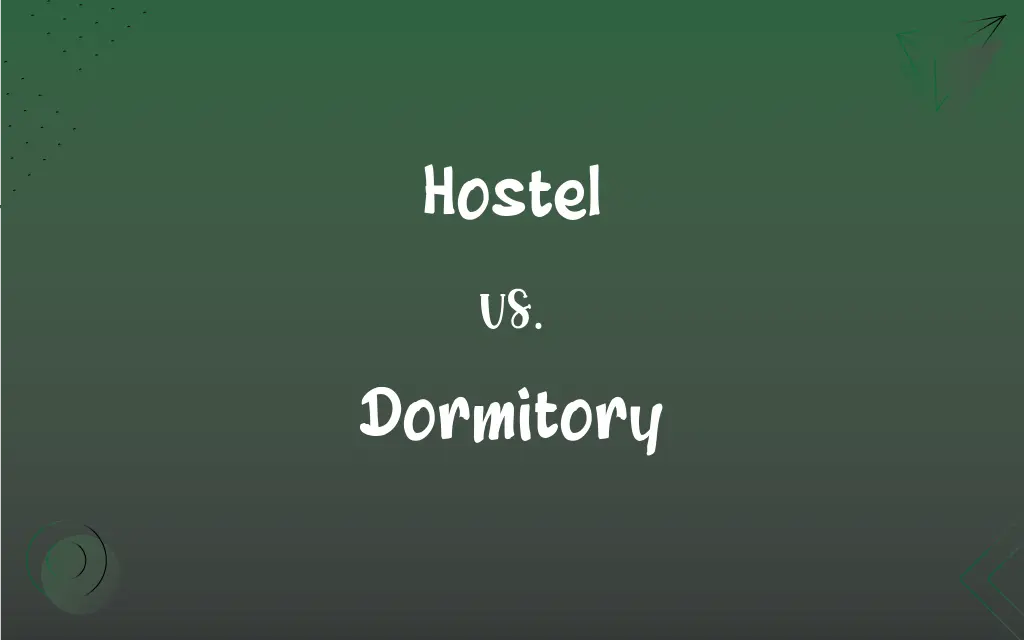Hostel vs. Dormitory: What's the Difference?
Edited by Aimie Carlson || By Janet White || Published on November 19, 2023
A "Hostel" is a budget-friendly accommodation for travelers, often with shared rooms, while a "Dormitory" is a large room or building providing sleeping quarters, typically for students.

Key Differences
"Hostel" and "Dormitory" both pertain to accommodations with multiple beds, often in a shared setting. A "Hostel" is usually a type of lodging targeted at travelers or backpackers looking for cost-effective solutions. On the other hand, a "Dormitory" predominantly refers to the sleeping quarters in educational institutions for students.
The concept of a "Hostel" is broader and can be found worldwide. They are designed for short-term stays, offer communal experiences, and may include shared facilities such as kitchens and lounges. "Dormitories" are typically associated with longer durations, such as a semester or academic year, and are linked closely to institutions or workplaces.
While "Hostels" are characterized by a more transient and diverse crowd, often from various parts of the world, "Dormitories" have a more stable set of occupants, usually students or workers of a specific institution or company.
It's worth noting that in some contexts outside the U.S., especially in British English, "Hostel" might refer to a student's residence similar to a "Dormitory." But in the general American context, the distinction between travelers' accommodations and student housing remains clear.
In essence, while both "Hostel" and "Dormitory" denote spaces with shared sleeping arrangements, their purposes, durations of stay, and target audiences differ considerably.
ADVERTISEMENT
Comparison Chart
Primary Use
Traveler accommodation
Student or institutional housing
Duration of Stay
Short-term (Days to weeks)
Longer-term (Months to years)
Associated Facilities
Shared kitchen, lounges, sometimes events
Study halls, cafeterias, possibly shared bathrooms
Occupants
Travelers, backpackers, diverse guests
Students, institutional workers, more stable occupants
Cultural Context
More common and varied worldwide
More specific to educational or institutional settings
ADVERTISEMENT
Hostel and Dormitory Definitions
Hostel
An establishment for short-term stays.
Hostels are perfect for those on a tight budget and short stays.
Dormitory
Sleeping quarters in an educational institution.
Freshmen were assigned rooms in the main dormitory.
Hostel
A place promoting communal living for visitors.
The best part of the hostel was the evening gatherings with fellow travelers.
Dormitory
A residence hall associated with an academic institution.
Life in the dormitory was a mix of studying and fun for the students.
Hostel
A budget-friendly accommodation for travelers.
She stayed in a hostel during her backpacking trip through Europe.
Dormitory
A large room providing multiple beds for sleeping.
The summer camp had a spacious dormitory for the kids.
Hostel
A lodging with shared facilities and rooms.
The hostel had a communal kitchen where guests cooked their meals.
Dormitory
Accommodation for students with communal facilities.
The university's dormitory was equipped with shared bathrooms and study areas.
Hostel
A traveler’s refuge offering basic amenities.
After a long day of hiking, the travelers sought shelter in a mountain hostel.
Dormitory
Building or space for group living and sleeping.
Employees at the remote research facility had a separate dormitory.
Hostel
A supervised, inexpensive lodging place for travelers, especially young travelers.
Dormitory
A building for housing a number of persons, as at a school or resort.
Hostel
An inn; a hotel.
Dormitory
A room providing sleeping quarters for a number of persons.
Hostel
To stay at hostels while traveling.
Dormitory
A community whose inhabitants commute to a nearby city for employment and recreation.
Hostel
A commercial overnight lodging place, with dormitory accommodation and shared facilities, especially a youth hostel
A rundown hostel
Dormitory
A room containing a number of beds (and often some other furniture and/or utilities) for sleeping, often applied to student and backpacker accommodation of this kind.
Hostel
(not US) A temporary refuge for the homeless providing a bed and sometimes food
Dormitory
A building or part of a building which houses students, soldiers, monks etc. who sleep there and use communal further facilities.
Hostel
(obsolete) A small, unendowed college in Oxford or Cambridge.
Dormitory
A dormitory town.
Hostel
(intransitive) To stay in a hostel during one's travels.
Dormitory
A sleeping room, or a building containing a series of sleeping rooms; a sleeping apartment capable of containing many beds; esp., one connected with a college or boarding school.
Hostel
(transitive) To lodge (a person) in a hostel.
Dormitory
A burial place.
My sister was interred in a very honorable manner in our dormitory, joining to the parish church.
Hostel
An inn.
So pass I hostel, hall, and grange.
Dormitory
A college or university building containing living quarters for students
Hostel
A small, unendowed college in Oxford or Cambridge.
Dormitory
A large sleeping room containing several beds
Hostel
A hotel providing overnight lodging for travelers
Hostel
Inexpensive supervised lodging (especially for youths on bicycling trips)
FAQs
Do both "Hostel" and "Dormitory" offer shared accommodations?
Yes, both typically feature shared sleeping spaces or rooms.
Is a "Hostel" primarily for students?
No, a "Hostel" is mainly for travelers, while a "Dormitory" is often for students.
Are "Dormitories" only found in educational settings?
Primarily, but they can also exist in institutional or workplace settings.
Is a "Hostel" usually cheaper than a hotel?
Yes, hostels are typically more budget-friendly than hotels.
Do "Dormitories" have communal facilities?
Yes, many have shared bathrooms, study areas, or common rooms.
Are "Hostels" safe for solo travelers?
While many are, it's essential to check reviews and ratings beforehand.
Are hostels only for young people?
No, people of all ages stay in hostels, although many cater to younger travelers.
Are all rooms in a "Hostel" shared?
While many are, some hostels offer private rooms at a higher rate.
Can "Dormitory" refer to a building?
Yes, a "Dormitory" can refer to an entire building housing students or workers.
Can the term "Hostel" mean student housing in some countries?
Yes, especially in British English, "Hostel" might refer to student accommodations.
Do "Dormitories" usually have meal plans?
Often, especially in academic settings, meal plans might be offered.
Do "Dormitories" allow visitors?
It depends on institutional rules; some might have strict visitor policies.
Is a "Dormitory" the same as a residence hall?
Essentially, yes. The term "residence hall" is often a more formal or preferred term for "dormitory."
Can you book a "Hostel" room in advance?
Yes, many hostels allow and even recommend advance bookings.
Is a "Hostel" the same globally?
The core concept is similar, but amenities, services, and culture can vary by region.
Are "Hostels" a Western concept?
While popular in Western countries, hostels exist worldwide.
Are "Dormitories" gender-segregated?
Often they are, especially in educational settings, but mixed-gender dorms do exist.
Do "Hostels" provide bedding?
Most do, but it's always good to check beforehand.
Are there private "Dormitories" outside of institutions?
Yes, some private entities offer dormitory-style housing, especially in densely populated cities.
Can "Dormitories" be off-campus?
Yes, some universities have affiliated dormitories or recommend certain off-campus housing options.
About Author
Written by
Janet WhiteJanet White has been an esteemed writer and blogger for Difference Wiki. Holding a Master's degree in Science and Medical Journalism from the prestigious Boston University, she has consistently demonstrated her expertise and passion for her field. When she's not immersed in her work, Janet relishes her time exercising, delving into a good book, and cherishing moments with friends and family.
Edited by
Aimie CarlsonAimie Carlson, holding a master's degree in English literature, is a fervent English language enthusiast. She lends her writing talents to Difference Wiki, a prominent website that specializes in comparisons, offering readers insightful analyses that both captivate and inform.






































































